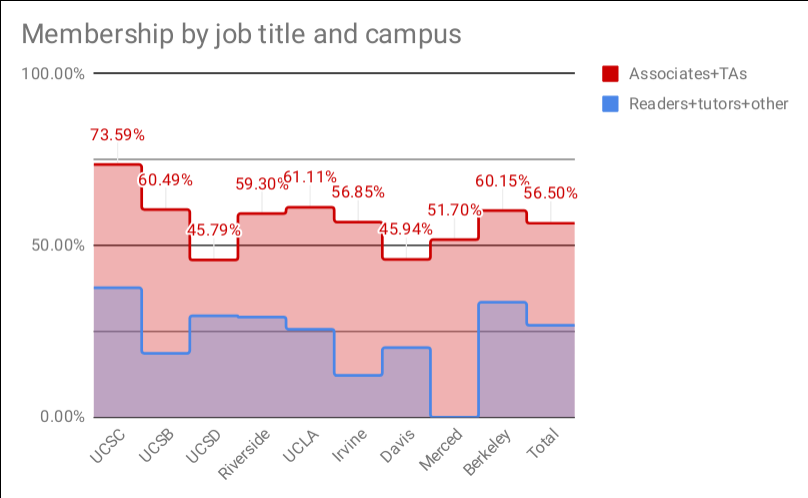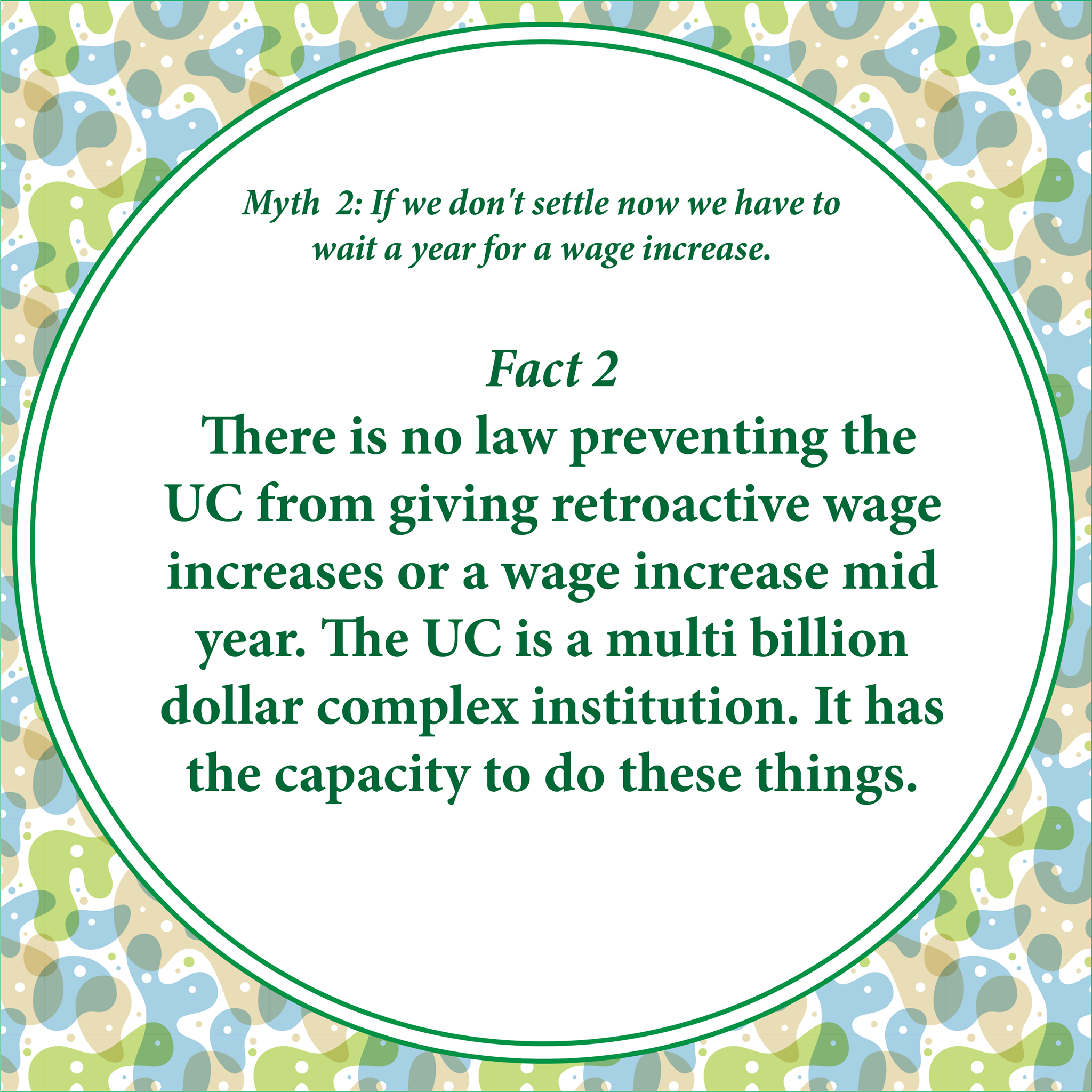Myth #0: If we vote not to ratify, we will definitely go on strike
FACT: If we win, the August 24 expiration can be extended by mutual agreement
Voting yes means entering into a four-year contract that includes a no-strikes clause. Voting no simply means we don’t agree to the contract in its current state. It doesn’t obligate us to strike, it just preserves our ability to. The ability to strike – a credible strike threat – is our leverage with management.
UC admin doesn’t want us to strike. That is why they are campaigning hard to tell us this is a good offer that we should ratify: They are afraid of what happens when workers know our own power. If our membership votes not to ratify management’s proposal, that sends a clear message to management that they (and our bargaining team) have underestimated our collective power and they need to do more to get us to vote away our right to strike for the next four years.
We extended the contract in June and we can do it again. Everything goes back on the table, including the expiration date. More about what this vote does and doesn’t mean.
Myth #1: The UC has offered us a 3.6% wage increase yearly for 4 years.
FACT: UC admin has actually only offered a 3%/year for 4 years wage increase.
The vote yes members of the bargaining team have deceptively included the $300/year remission of campus fees as a “pay increase”. However, our union has taken the official position back in January that fee remission is not income, and on that basis we opposed Trump’s “grad tax”.
Furthermore, nothing is stopping the UC from just raising the cost of campus fees by another three hundred dollars, basically negating this so called “pay raise”.
Lastly, if you are eligible to fill out the FAFSA do so, because you will typically automatically receive a grant that will cover the full cost of the campus fee.
Myth #2: If we don’t settle now we have to wait a year for a wage increase.
FACT: There is no law preventing the UC from giving retroactive wage increases or a wage increase mid year.
The UC is a multi billion dollar complex institution. It has the capacity to do these things. Last time we negotiated into fall, the UC doubled its wage increase offer – starting mid-year. (And we still won more by striking) [More in-depth wage analysis]
Myth #3: We are below majority membership so we shouldn’t try to build for a strike.
FACT: Statewide TAs and Associate Instructors are actually above majority (56%).
There is absolutely the ability to have a majority TA and AI strike. Membership numbers are skewed by the lack of undergraduate tutors that have joined our union. Tutors also have far less disruptive capability than TAs and AIs do, so their lack of involvement in the strike, will be much less impactful than if a majority of tutors went on strike but no TAs went on strike.

Myth #4: Other campus unions have gone on strike and gotten a lower offer on wages than we already have, therefore we don’t have to and shouldn’t strike.
FACT: We are stronger together.
- Last time we went on strike with AFSCME (in November of 2013) both unions got a better wage increase from the UC because together our strike shut down much more of the university’s functioning.
- The UC administration is quite racist and it regularly makes AFSCME strike many times and negotiate for nearly two years for a decent wage increase because their members are majority Workers of Color.
Myth #5: The bargaining team has spent countless hours in negotiations already and the UC has given its last best and final offer so we cannot get anything better.
FACT: real movement happens outside the bargaining room
- When we negotiated our last contract, our team was driven by the philosophy that real movement happens outside the bargaining room. So we built on the ground actions and two strikes to pressure the UC and it worked. It was a better offer than we had gotten in the previous contract, and is a better offer than what we are being offered now.
- Last time the UC gave its last best offer and then after a strike gave a significantly better offer. It’s not about what the team can win, its about what we as a union can win fighting together.
- Also: if we settle now we are locked into a contract for 4 years so cannot legally strike to improve our lives and working conditions during that time. Why get rid of our best weapon when we haven’t even used it yet?
Myth #6: We should settle for wages now and we have committees to fight non economic issues.
FACT: Our wage offer is below inflation, and most non-economic changes simply codify current law or university policy.
Our wage offer isn’t the best we can get (see above) and the committee on disarm/demil isn’t actually a committee, doesn’t have any power, and isn’t actually about disarming/demilitarizing it’s about discussing things we already know and have presented to the UC, so its moving backwards not forwards. Our union prides itself on being on the leading edge of fighting for social justice in the US labor movement and we have made many firsts, so lets not accept a step backward on this issue of racial justice while nationally we are in the middle of the biggest racial justice movement since the 1970s.
Myth #7: We should settle now so that we can move on to unionizing GSRs. Not settling now for a few extra bucks is selfish.
FACT: Settling for a contract now when we could win something better is hardly the example we want to set right before trying to unionize GSRs.
What better way to show the power of a union and get GSRs organizing now than to organize for a strike that many of them will be participating in as TAs, we can then find those leaders and have them head up the GSR organizing. Voting NO now and fighting for more is strategically the best move for both groups.
